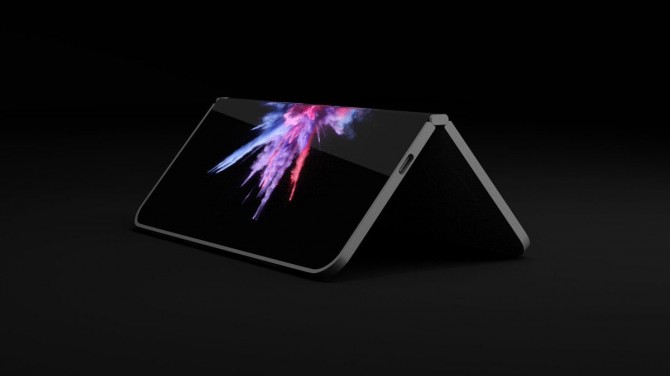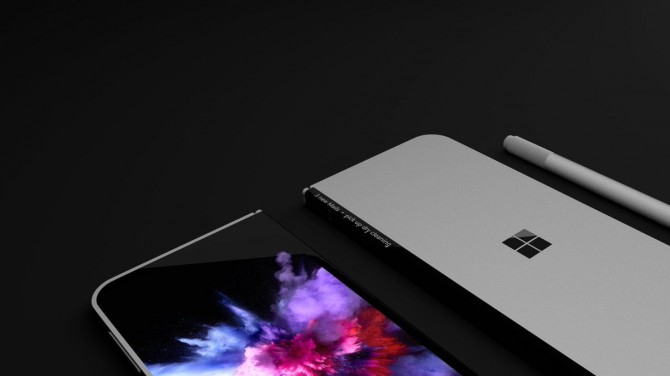Microsoft Andromeda Rumor Roundup: Everything We Know So Far
Microsoft, having lost the smartphone war, has its eyes on the next evolution of portable computing, and it's called Andromeda. (At least, that's the code name.) But when should you expect it to launch, and what will it do, and who will it be for?
We've had our eyes on the smoke coming out of the rumor mill for this potentially-revolutionary device, and are pretty excited about its potential. Not only does it seek to be the next major kind of portable computer, but its hinged design is extremely intriguing. Here's what we're seeing about Microsoft Andromeda.
What is Andromeda?
Patents and rumors have long pointed to Andromeda being a portable computer that looks a lot like a notebook. A hinge would allow for its dual screens to fold on top of each other,
Internal Microsoft emails obtained by The Verge describe Andromeda as a product that's originated within Microsoft, and something that will birth a "new and disruptive" category of devices. Those same emails call it a "pocketable Surface device form factor that brings together innovative new hardware and software experiences to create a truly personal and versatile computing experience."
Reports dating back to last October suggest that the Andromeda device would have the capability to make cellular calls, making it the oft-rumored Surface Phone. Andromeda dates even further back, and it's been under development for at least 2 years.
What does it look like?
While no images have leaked directly from Microsoft itself, we've got something that's just as good. Current engineering samples are nearly identical to the images tweeted by the Austria-based designer David Breyer. Breyer used the most recent patents as the basis for his designs.
@zacbowden @h0x0d @windowscentral #Surface Andromeda Render according to the latest patents pic.twitter.com/CmbvlfETtU — David Breyer (@D_Breyer) December 18, 2017
Yes, not only is Andromeda going to have two main screens, but it appears that a third display — which looks like a slice of a screen — will be built into the hinge. Microsoft is also experimenting with using the Andromeda with styli, which makes sense given how much the company has prioritized pen input on its 2-in-1s with Windows Ink.
Sign up to receive The Snapshot, a free special dispatch from Laptop Mag, in your inbox.
What specs will the Andromeda feature?
Microsoft isn't taking any option off the table. The company is experimenting with ARM processors for the Andromeda, while not having any allegiances to Qualcomm, and still considering Intel.
What apps will it run?
The most logical programs for this transformable device are Microsoft's Universal Windows Platform apps, which are made to run on both desktops and tablets. They're seemingly ready for a smaller format, as many have more than enough white space, and the buttons are large, made for tapping with your fingers.
UWP apps became more likely with Windows 10 code discovered in May that referenced Andromeda and Project Polaris, a reportedly lightweight version of Windows that would be built entirely around UWP apps, making it much more locked-down, ala Windows 10's S Mode.
We've got some bad news
The Verge noted that Microsoft was "tentatively planning to release Andromeda in 2018," with some pegging it for a tandem-release with the Windows 10 1809 update, due this October. A story from the venerable Mary Jo Foley over at ZDNet throws cold water on that idea, citing sources who say the device will not, in fact, launch this year.
The rationale for holding Andromeda is split between quality concerns and a lack of a motivating reason for the company to release a pocket-sized, dual-screen device. And if Microsoft doesn't think it has a way to sell the public on such a device, it would make sense that it would wait until such a pitch is ready.
If Andromeda is dead, it may be a victim of the recent leadership shakeup at Microsoft. Most of the work on the pocket-sized device was done under the leadership of Terry Myerson (who's on his way out) and the new leadership may not be as keen to prioritize it.
Microsoft reportedly sees Andromeda as the response to its failures with Windows Phone. The aforementioned leaked email refers to the device as one that "will blur the lines between mobile and stationary computing." Microsoft won't get a chance to right its wrongs, though, if Andromeda doesn't make it to daylight.
Credit: David Breyer
Tablet Guide
- Kids Tablets to Buy (or Avoid)
- 10 Tablets with the Longest Battery Life
- Tablet Buying Guide: 8 Essential Tips
- The Best Tablets for Less Than $200
- Chromebook vs. Tablet: Which Should You Buy?
- Why 4G Tablets Are a Total Rip-Off
- How to Sell, Trade In or Donate Your Old Tablet
- iPad Buying Guide: Which One is Right for You?
- How to Use Your iPad as Your Only PC
Henry was a contributing writer at Laptop Mag. He penned hundreds of articles, including helpful how-tos for Windows, Mac, and Gmail. Henry has also written about some of the best Chromebooks, and he has reviewed many Apple devices, including various MacBook Air laptops. He is now a managing editor at our sister site Tom's Guide, covering streaming media, laptops, and all things Apple.


